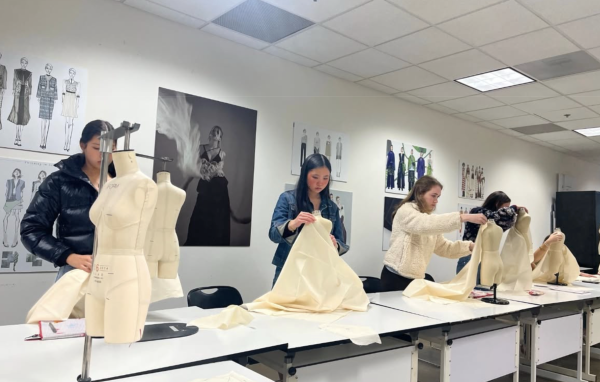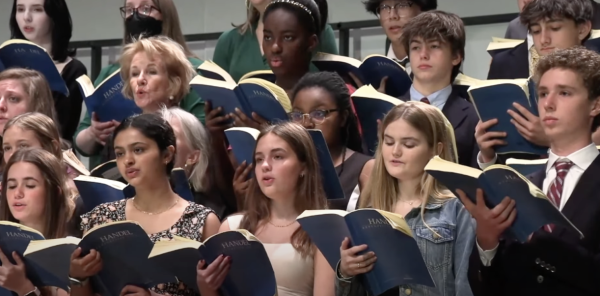Poetry Tuesdays resume in Spring
All are invited to Parker Board Room on Tuesdays from 1:10-1:40 to experience the calming environment of Poetry Tuesdays. As you walk in, the soft chatter and dim lighting entice you, along with a warm greeting from English teachers Mario Chard and Jennifer Dracos-Tice, the event’s organizers. Students are scattered about on comfortable chairs with a podium at the front of the room. Poetry Tuesdays were inaugurated in 2015 by Chard with the goal of creating an environment that encourages students to enjoy poetry and not feel the pressure of being judged in honor of National Poetry Month. Both students and faculty are encouraged to read poems of their choice, aiming to celebrate existing authors and their works and to give people a chance to share works that resonate with them.
“It’s a reminder that it doesn’t have to be a competition; you just get up and worry about only what’s in front of you and listen to those in the world that have something to say,” said Dracos-Tice.
This event has stayed strong since 2015, going so far as to hold virtual sessions throughout Covid and continuing for the first time in person this year. The space provides a unique environment that aims to spark an interest in newcomers and give young writers an open space in the writing community.
“It can move people in ways that they might not anticipate. It allows them to listen to poems that are read well and read from a poet that means something to them,” said Chard.
This year’s theme, “The Poetry of War and Resistance,” is a tribute to the war in Ukraine and the struggles of its citizens.
“A huge group of faculty among all disciplines got together and wanted to do something in support of Ukraine and saw that poetry was a way in,” said Chard.
Also organized by Upper School head librarian Liesel Good, this year’s theme has been a huge success, allowing people to shed light on the perspectives of those directly impacted by the war and how writing can be an outlet. In this hard time of struggle, literary works are more important than ever. In fact, the poem “We lived Happily during the War” by Ilya Kaminsky has been used as a uniting source for Ukrainians during the war:
“In times of fighting, it’s important that there are more translations of people’s works in foreign countries who are directly impacted by the war,” said Dracos-Tice.
At a recent session, Chard commenced the meeting by discussing a black-and-white picture projected on the screen. In it, an old woman was feeding a flock of pigeons. It wasn’t until later that Chard explained the significance of the picture. This image, taken April 8, 2022, was taken in Ukraine and posted by a Georgia Tech professor who pointed out how she was feeding the pigeons despite the bombs dropping out of the sky. Chard then explained that the session’s poems would focus on optimism during wars and how, like in this picture, one might decide to focus on the positives and make the best of one’s situation.
Chard’s goal in creating Poetry Tuesdays was initially to give people an outlet to share their own works and to celebrate poetry month. It has since morphed into a space to celebrate existing authors’ works that revolve around the yearly theme. In meetings, some have become regulars, such as Steve Frappier, director of college counseling, who often shares works of his own and has always supported the meetings. Other teachers from all departments often read poems they enjoy as well to achieve the hopeful result of making more students feel comfortable to share their favorite poems.
“I always leave feeling refreshed, and I hope students do too,” said Dracos-Tice.
As for the certain stigmas that arrive with liking poetry, Chard said that his hope is to diminish this feeling of being judged for enjoying poetry and literature.
“We’ve tried to create a culture that values these things,” he said.
As for the readers, people you wouldn’t expect to be reading are often there, which is one of the wonders of this group.
“Young writers had the opportunity to share their work and admit that they might like this experience,” said Chard.
This experience not only creates opportunities for aspiring writers but the readings also inspire students who may not initially feel strongly about poetry.
“I recall a time a student came up to me and said that she had been inspired by a poem I had read,” said Dracos-Tice. “Weeks later, she read a poem by the same poet at the meeting and it was wonderful to see that impact.”



